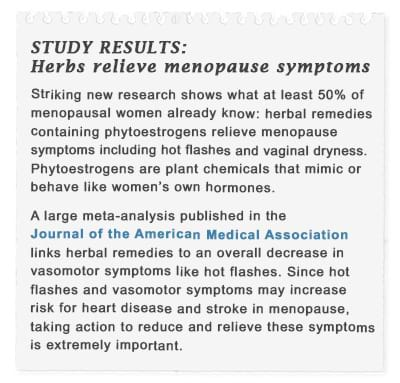By Dr. Mary James, ND
Research on menopause — and women’s interest in it — keeps growing, but as new information rolls out at such a dizzying pace, it’s impossible to keep up. With everything so accessible now, where do you start and when do you stop? Also, it doesn’t help that newer studies often change the messages that we’ve already being told.

As a doctor, I want to lessen any confusion you may have about menopause and also what the new research means to you. The latest findings tell us a lot about hot flashes, memory problems and exercise, including information you can use to reduce troubling symptoms so you can feel better.

Suffering from hot flashes?
If you’re one of the 50-80% of midlife women who have hot flashes, you’re all too familiar with that sudden sensation of heat in your body that can quickly spread through the chest, neck, and face and cause you to urgently peel off layers while everyone else around you seems perfectly comfortable. When hot flashes are joined by other unsettling symptoms, like chills, perspiration, anxiety and night sweats — you could be waking up in a pool of perspiration with a racing heart.
The latest research about hot flashes
Much of the literature tells us that these annoying symptoms (collectively called “vasomotor symptoms,” or VMS) will last from a few months to a few years. Recent studies, however, suggest that hot flashes can last more than a decade for many women. So, here are two examples of what researchers are finding:
- One of the longest-running and largest studies on the subject revealed that some women had symptoms for as long as 14 years.
- A survey of 2,020 menopausal Australian women revealed that 6.5% of them suffer symptoms while in their mid-60s. Even a meta-analysis reporting a median symptom duration of only around four years found that 10% of women in these studies were still symptomatic 12 years after their final menstrual period.
What you can do for your hot flashes
So, how can you predict how long your hot flashes could be a problem? It appears that the earlier your hot flashes appear, the longer they could last — and you may want to consider your options for hot flash relief.
In one study, 14% of women with early debilitating symptoms had already had hot flashes three years before menopause.
Another study compared the median duration of hot flashes for women who developed them at different stages:
- Women who developed hot flashes while still premenopausal: 11.25 years
- Women who were flushing while they entered menopause: 7.35 years
- Women who started flushing when a few years into menopause: 3.84 years
No matter when you begin having hot flashes, luckily there are many ways to reduce them, including stress management, mind/body therapies, specific herbs such as those found in Herbal Equilibrium, soy isoflavones, nutrients, and limiting alcohol and caffeine. I encourage you to see why herbal remedies for menopause are so effective.
Brain fog in menopause: Is it real?
Do you ever wish your brain had windshield wipers, then a few swooshes and everything could be clear again? It’s disconcerting to be used to a clear focus and then lose it, or having good recall for names and then suddenly come up empty. This is especially scary when “bad days” turn into weeks or months and you have no idea how to turn it around.
Brain fog and memory problems have many different causes, but if you’re around 50 and your focus is getting fuzzy as your periods become irregular, you can probably blame menopause. Brain fog and menopause brain may be in your head, but not in your imagination — it’s real.
The latest research about brain fog
Brain fog is real, but it’s more like a temporary hiccup in the learning process during perimenopause.
Studies are finding that perimenopausal women with forgetfulness not only have trouble staying focused, but also have a harder time learning new information. While the brain activity needed to learn to play an instrument or memorize a poem continues during menopause, the process is slower in many women during perimenopause. This is compared to their younger — and even older — counterparts. Previous studies, reported similar findings — once women hit perimenopause, they couldn’t learn as easily as they could before.
Memory problems in menopause usually show up during the first year of a woman’s final period. Estrogen levels can fluctuate wildly at this time, sometimes rising higher than premenopausal levels.
What else affects brain function in perimenopause?
- In many studies, the women with brain fog also had anxiety, depression, and/or sleep problems — any of these can affect thinking.
- A 2014 meta-analysis found that peri- and postmenopausal women scored lower for verbal memory and memory and were more prone to depression.
- Women entering menopause are often dealing with multiple life stressors (including unexpected symptoms) that can induce anxiety and insomnia.
- High levels of the stress hormone, cortisol, reduce verbal fluency in postmenopausal women. Cortisol also increases after a hot flash.
Studies that measured the women’s hormone levels found no correlations with their cognitive function, however, a single test at one point in time can’t detect the hormonal ups and downs characteristic of perimenopause. The parts of the brain that support verbal and working memory are rich in estrogen receptors, so it’s conceivable that a woman’s brain during perimenopause is extra sensitive to these hormone fluctuations. Estrogen supports the growth and survival of neurons, and also plays a role in serotonin and HPA-axis regulation, important in mood.
What you can do for your memory
Rest assured that most memory problems that occur while in perimenopause are not signs of early Alzheimer’s. The fog usually clears once your body has stepped off the roller coaster and your estrogen levels stabilize.
For example, in a four-year study that followed 2,362 midlife women, those in premenopause and postmenopause showed consistent improvements in test scores over time, whereas test scores among women in perimenopause didn’t budge. So, it’s the transition that can be a bit crazy-making, not menopause itself.
As for long-term memory risk, dementia risk appears more influenced by cardiovascular risk factors, which can mount during menopause. Consider the transition into menopause an opportunity to get thoroughly checked out and improve your overall health.
Do I really have to exercise? I’m tired!
64% of middle-aged women who got less than three 30-minute sessions per week of moderate activity like walking had worse menopausal symptoms.
We know exercise is good for our health, and it’s especially true for women at midlife, when our body composition changes in ways that cause disease risks to climb. Ironically, this is also a time when our energy levels can plummet and make it harder to keep moving.
Unfortunately, inactivity during menopause can lead to worse symptoms. In a large study done this year, 64% of middle-aged women who got less than three 30-minute sessions per week of moderate activity like walking had worse menopausal symptoms, and more depression, anxiety, insomnia, and obesity than the more active women.
The latest research on exercise during menopause
Many women have limited time, but there is good news about exercise and menopause. While it makes sense that an active lifestyle would produce opposite results of a sedentary one, many studies show moderate exercise can impact body composition and disease risk in middle-aged women:
- Only 30 minutes of brisk walking three times weekly reduced symptoms, lipids and weight in women during perimenopause.
- Two hours a day of standing or walking around the house subsequently reduced risk of obesity by 9% and risk of diabetes by 12%. Spikes in glucose and insulin after meals can predict the development of type 2 diabetes, but a leisurely 15-minute walk after eating can reduce glucose spikes by 50%.
- Many studies have shown how regular exercise can increase energy, as well as reduce menopausal symptoms, prevent obesity, support brain function, promote a sense of well-being, support bones and joints, and decrease inflammation. It also can reduce risk of diabetes, cancer, cardiovascular disease, dementia, and premature death.
Although every little bit helps, the research comparing levels of physical activity consistently show the more you move, the more you benefit. That said, research also shows that you don’t need to do intense exercise for hours a day to see real benefits in how you feel and for your long-term health.
Good news about moderate exercise during menopause
As you start moving, your energy will rise; as you keep moving, your health will improve.
Any overextended, overtired woman knows how hard it is to stick with an exercise program, but in my experience, finding an activity you enjoy helps keep exercise a priority. Walking is a great starting point, because it is gentle and accessible to everyone. Consider this time of life as an opportunity to improve your overall health, with a regular exercise program being part of it. Start moving and then your energy will rise. Then as you keep moving, your health will improve. Invite a friend to join you, and get going!
How moderate exercise benefits your health
| Health benefits | What to do |
|---|---|
| Decrease fatigue | 30 minutes/day of moderate to vigorous exercise increased energy in postmenopausal women, regardless of % body fat. |
| Reduce weight/diabetes | 2 hours/day of standing or walking reduces obesity and diabetes by 9% and 12%, respectively, 1 hour/day of brisk walking reduces them by 24% and 34%. |
| Lessen cognitive decline | Postmenopausal women engaging in resistance training at least 2 times/week had less brain shrinkage and progression of white matter lesions compared to both women doing resistance training only 1 time/week and those who just did stretching and balance training. |
| Cut breast cancer risk | In a large study, women who walked 7 hours/week had a 14% lower risk of breast cancer in menopause compared to women who walked 3 hours or less per week. The women who engaged in both walking and vigorous activity reduced their risk by 25%. |
| Lower risk of heart disease | Women who engaged in moderate-intensity exercise at least 4 times/week reduced their cardiovascular mortality by 47%, whereas those doing vigorous-intensity exercise at least 4 times/week lowered their risk by 80%. |
A big step to feeling better during menopause
Somewhere along the way, not feeling your best during menopause might have started feeling normal. After all, most of us spend the majority of our day taking care of others, whether it’s children, parents, friends or work colleagues, so finding the time to try to get through all the information about own symptoms can easily fall to the bottom of the to-do list. So I want to congratulate you for taking this step of understanding your symptoms and what’s happening in menopause. Because you’re already on your way to feeling better.
References and further reading
Lewis R. Menopausal Symptoms May Last 7 or More Years. February 17, 2015. Medscape OB/GYN & Women’s Health. Accessed February 5, 2016.
Avis NE, Crawford SL, Greendale G, et al. Duration of menopausal vasomotor symptoms over the menopause transition. JAMA Intern Med. 2015 Apr;175(4):531-539.
Freeman EW, Sherif K. Prevalence of hot flushes and night sweats around the world: a systematic review. Climacteric. 2007 Jun;10(3):197-214.
Politi MC, Schleinitz MD, Col NF. Revisiting the duration of vasomotor symptoms of menopause: a meta-analysis. J Gen Intern Med. 2008 Sep;23(9):1507-1513.
Avis NE, Crawford SL, Greendale G, et al. Duration of menopausal vasomotor symptoms over the menopause transition. JAMA Intern Med. 2015 Apr;175(4):531-539.
Gartoulla P, Worsley R, Bell RJ, Davis SR. Moderate to severe vasomotor and sexual symptoms remain problematic for women aged 60 to 65 years. Menopause. 2015 Jul;22(7):694-701.
Politi MC, Schleinitz MD, Col NF. Revisiting the duration of vasomotor symptoms of menopause: a meta-analysis. J Gen Intern Med. 2008 Sep;23(9):1507-1513.
Mishra GD, Kuh D. Health symptoms during midlife in relation to menopausal transition: British prospective cohort study. BMJ. 2012 Feb 8;344:e402.
Freeman EW, Sammel MD, Lin H, et al. Duration of menopausal hot flushes and associated risk factors. Obstet Gynecol. 2011 May;117(5):1095-1104.
Tomaselli KP. Steps to a nimble mind: Physical and mental exercise help keep the brain fit. November 17, 2008.
Weber M, Mapstone M. Memory complaints and memory performance in the menopausal transition. Menopause. 2009 Jul-Aug;16(4):694-700.
Weber MT, Mapstone M, Staskiewicz J, Maki PM. Reconciling subjective memory complaints with objective memory performance in the menopausal transition. Menopause. 2012 Jul;19(7):735-741.
Greendale GA, Huang MH, Wight RG, et al. Effects of the menopause transition and hormone use on cognitive performance in midlife women. Neurology. 2009 May 26;72(21):1850-1857.
Fuh JL, Wang SJ, Lee SJ, et al. A longitudinal study of cognition change during early menopausal transition in a rural community. Maturitas. 2006 Mar 20;53(4):447-453.
Weber MT, Rubin LH, Maki PM. Cognition in perimenopause: the effect of transition stage. Menopause. 2013 May;20(5):511-517.
Weber MT, Rubin LH, Maki PM. Cognition in perimenopause: the effect of transition stage. Menopause. 2013 May;20(5):511-517.
Greendale GA, Huang MH, Wight RG, et al. Effects of the menopause transition and hormone use on cognitive performance in midlife women. Neurology. 2009 May 26;72(21):1850-1857.
Henderson VW, Guthrie JR, Dudley EC, et al. Estrogen exposures and memory at midlife: a population-based study of women. Neurology. 2003 Apr 22;60(8):1369-1371.
Weber MT, Mapstone M, Staskiewicz J, Maki PM. Reconciling subjective memory complaints with objective memory performance in the menopausal transition. Menopause. 2012 Jul;19(7):735-741.
McEwen BS. Invited review: Estrogens effects on the brain: multiple sites and molecular mechanisms. J Appl Physiol (1985). 2001 Dec;91(6):2785-801.
McEwen BS. Invited review: Estrogens effects on the brain: multiple sites and molecular mechanisms. J Appl Physiol (1985). 2001 Dec;91(6):2785-801.
Greendale GA, Derby CA, Maki PM. Perimenopause and cognition. Obstet Gynecol Clin North Am. 2011 Sep;38(3):519-535.
Greendale GA, Huang MH, Wight RG, et al. Effects of the menopause transition and hormone use on cognitive performance in midlife women. Neurology. 2009 May 26;72(21):1850-1857.
Greendale GA, Derby CA, Maki PM. Perimenopause and cognition. Obstet Gynecol Clin North Am. 2011 Sep;38(3):519-535.
Grindler NM, Santoro NF. Menopause and exercise. Menopause. 2015 Dec;22(12):1351-1358.
Ward-Ritacco CL, Adrian AL, O’Connor PJ, et al. Feelings of energy are associated with physical activity and sleep quality, but not adiposity, in middle-aged postmenopausal women. Menopause. 2015 Mar;22(3):304-311.
The North American Menopause Society. Physical activity has greater impact on body composition in postmenopausal women. October 19, 2015. Accessed February 5, 2016.
Zhang J, Chen G, Lu W, et al. Effects of physical exercise on health-related quality of life and blood lipids in perimenopausal women: a randomized placebo-controlled trial. Menopause. 2014 Dec;21(12):1269-1276.
Hu FB, Li TY, Colditz GA, et al. Television watching and other sedentary behaviors in relation to risk of obesity and type 2 diabetes mellitus in women. JAMA. 2003 Apr 9;289(14):1785-1791.
Manohar C, Levine JA, Nandy DK, et al. The effect of walking on postprandial glycemic excursion in patients with type 1 diabetes and healthy people. Diabetes Care. 2012 Dec;35(12):2493-2499. Ward-Ritacco CL, Adrian AL, O’Connor PJ, et al. Feelings of energy are associated with physical activity and sleep quality, but not adiposity, in middle-aged postmenopausal women. Menopause. 2015 Mar;22(3):304-311.
Hu FB, Li TY, Colditz GA, et al. Television watching and other sedentary behaviors in relation to risk of obesity and type 2 diabetes mellitus in women. JAMA. 2003 Apr 9;289(14):1785-1791.
Kushi LH, Fee RM, Folsom AR, et al. Physical activity and mortality in postmenopausal women. JAMA. 1997 Apr 23-30;277(16):1287-1292.
Raz N, Rodrigue KM, Head D, et al. Differential aging of the medial temporal lobe: a study of a five-year change. Neurology. 2004 Feb 10;62(3):433-438.
Bolandzadeh N, Tam R, Handy TC, et al. Resistance Training and White Matter Lesion Progression in Older Women: Exploratory Analysis of a 12-Month Randomized Controlled Trial. J Am Geriatr Soc. 2015 Oct;63(10):2052-2060.
Hildebrand JS, Gapstur SM, Campbell PT, et al. Recreational physical activity and leisure-time sitting in relation to postmenopausal breast cancer risk. Cancer Epidemiol Biomarkers Prev. 2013 Oct;22(10):1906-1912.











